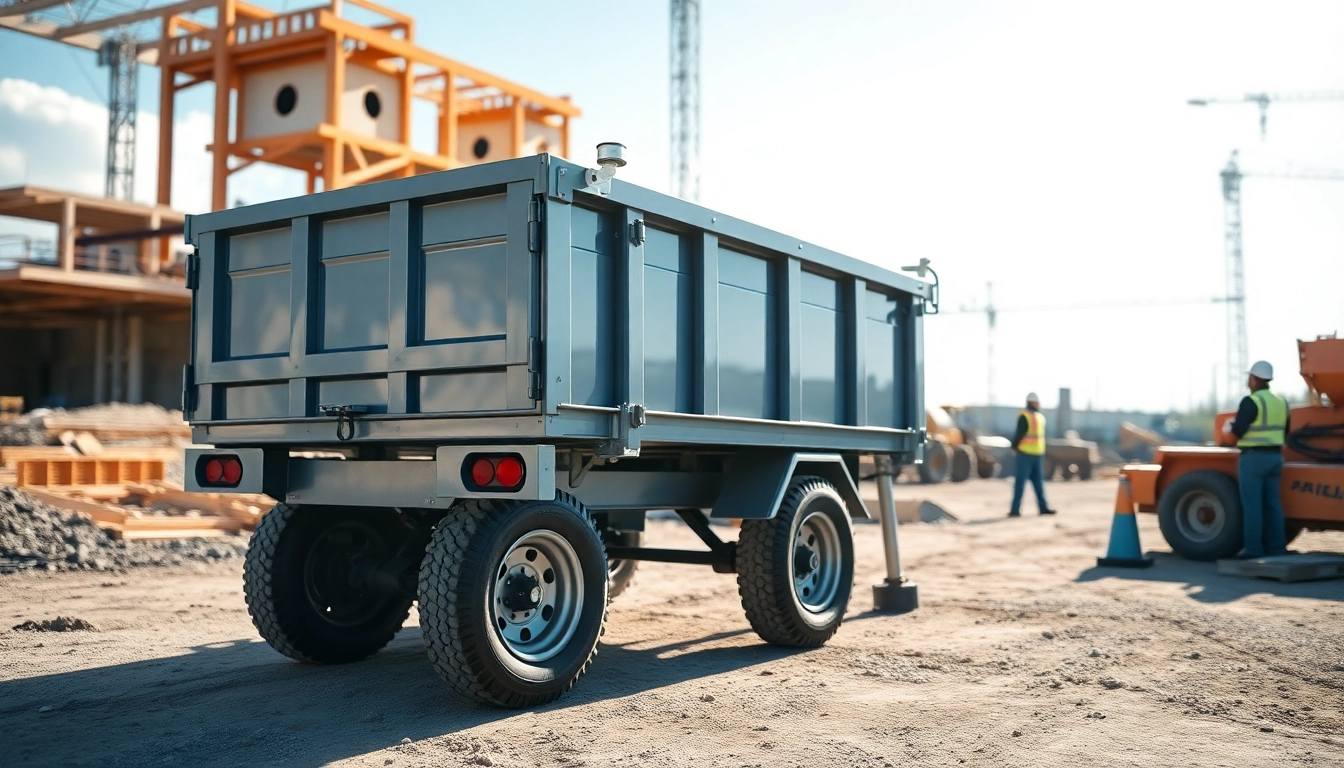Understanding Hydraulic Dump Trailers
What is a Hydraulic Dump Trailer?
A hydraulic dump trailer is a versatile piece of equipment used in various industries, particularly in construction and landscaping. These trailers enable quick and efficient unloading of heavy materials such as dirt, gravel, and debris. Designed with hydraulic systems, they utilize the mechanics of pressurized fluid to lift the trailer bed, allowing loads to be dumped swiftly at job sites. Unlike traditional dump trailers that rely on manual effort, hydraulic dump trailers streamline the unloading process, saving time and reducing labor costs.
Key Features and Advantages
Hydraulic dump trailers are equipped with several features that enhance their functionality and make them appealing to users:
- Hydraulics: The central feature of these trailers is their hydraulic lift system, which allows for easy raising and lowering of the trailer bed. This system typically includes two hydraulic cylinders that provide smooth operation.
- Durability: Most hydraulic dump trailers are constructed from heavy-duty materials to withstand tough working environments, making them ideal for heavy hauling.
- Weight Capacity: Available in various sizes, these trailers can handle significant weights, with some models capable of carrying loads up to 18,000 pounds or more.
- Ease of Use: Operated with the push of a button or a remote control, unloading cargo is simplified, providing efficiency in any work environment.
- Versatility: Hydraulic dump trailers can be used for a wide range of applications beyond just construction, such as agriculture, landscaping, and waste management.
How They Work: Mechanisms Explained
The hydraulic dump trailer functions through a simple yet effective hydraulic system. The process begins when the operator activates the hydraulic pump, which pressurizes the hydraulic fluid. This pressurized fluid then flows into the hydraulic cylinders attached to the trailer’s lift mechanism. As the cylinders extend, they raise the trailer bed, allowing the load to be dumped out the back of the trailer. The angle at which the trailer bed lifts can usually be adjusted based on the specific model.
When the load is cleared, the operator can lower the trailer bed by reversing the hydraulic flow, allowing the fluid to return to the reservoir. This efficient system minimizes the physical labor involved in unloading, offering significant advantages in terms of productivity.
Types of Hydraulic Dump Trailers
Standard vs. Custom Options
When considering hydraulic dump trailers, buyers can typically choose between standard models and custom-built options. Standard models are mass-produced with fixed features and specifications, making them a cost-effective choice for many users. These trailers come in various configurations, assuring a wide selection for diverse needs.
Custom hydraulic dump trailers, on the other hand, are tailored to meet specific user requirements. This could include modifications in size, weight capacity, material, or additional features such as extra gates or toolboxes. Although usually more expensive, custom trailers can significantly enhance efficiency for specialized tasks.
Choosing the Right Size and Capacity
Selecting the appropriate size and capacity of a hydraulic dump trailer is crucial for optimizing operational efficiency. Factors to consider include:
- Load Volume: Estimate the materials you will typically transport. For instance, if you’re often hauling heavy dirt or gravel, a trailer with a higher weight capacity would be advisable.
- Vehicle Compatibility: Ensure that your towing vehicle can handle the trailer’s weight. Each hydraulic dump trailer will have a Gross Vehicle Weight Rating (GVWR) that should not exceed the towing capacity of your truck or tractor.
- Job Site Restrictions: Consider the dimensions of the areas where you intend to fill and unload. A larger trailer may not be well-suited for tight construction sites.
Popular Brands and Models
Many manufacturers produce high-quality hydraulic dump trailers, catering to various specifications and budgets. Notable brands include:
- Big Tex Trailers: Known for robust designs, Big Tex offers a range of dump trailers that cater to both personal and commercial use.
- Sure-Trac: This brand is recognized for its innovative hydraulic lifting solutions and diverse range of heavy-duty trailers.
- Diamond C Trailers: They bring to the market a reputation for durability and customizing options that appeal to specialized needs.
Each brand typically has several models that serve different purposes. For example, customers looking for lightweight models might opt for small-sized dump trailers, whereas those needing heavy-duty options may choose trailers capable of carrying much larger payloads.
Buying Hydraulic Dump Trailers
Evaluating Your Needs and Budget
Before purchasing a hydraulic dump trailer, potential buyers should carefully evaluate their needs. This involves assessing the type of materials to be transported, frequency of use, and the typical load size. Additionally, budgets play a vital role; it’s essential to find a balance between quality and affordability. Investing in a well-built trailer will save costs on maintenance and repairs in the long run.
New vs. Used: Pros and Cons
One major decision when buying a hydraulic dump trailer is whether to opt for a new or used model. Each option presents distinct pros and cons:
- New Trailers:
- Come with a warranty, thus reducing the risk of defects or failures.
- Incorporate the latest technology and features.
- Allow buyers to customize specifications to fit their unique requirements.
- Used Trailers:
- Cost significantly less than new models, providing a budget-friendly option.
- Can be readily available for immediate purchase, often without the wait time associated with ordering new trailers.
- However, there’s an associated risk of wear and tear, as well as potential maintenance issues.
Where to Find Hydraulic Dump Trailers for Sale
Searching for hydraulic dump trailers for sale can be conducted through various channels:
- Dealerships: Local trailer dealerships frequently stock a variety of trailers, both new and used. Visiting these locations offers buyers the chance to inspect and test them in person.
- Online Marketplaces: Websites like Craigslist, eBay, and specialized trailer websites allow users to browse an extensive range of options from the comfort of their homes.
- Auctions: Auctions can provide opportunities to buy hydraulic dump trailers at reduced prices; however, buyers must exercise caution and do due diligence to ensure quality.
Maintenance and Care
Essential Maintenance Tips
Proper maintenance is crucial for prolonging the life of a hydraulic dump trailer and ensuring it operates efficiently. Here are some essential maintenance tips:
- Regular Inspections: Routinely inspect the hydraulic system, including hoses and fittings, for leaks or damage.
- Lubrication: Regularly lubricate moving parts, such as the lift arms and hitch components, to minimize friction and wear.
- Check Tires: Ensure that tires are properly inflated and in good condition to avoid mishaps while hauling heavy loads.
Common Issues and Troubleshooting
Even with proper maintenance, issues can arise. Common problems include:
- Hydraulic Leaks: Leaks can reduce lifting capability. If detected, it’s crucial to replace damaged hoses or seals promptly.
- Electrical Failures: If the hydraulic pump doesn’t respond, check the electrical connections and battery. Issues may range from loose terminals to faulty wiring.
- Wheel Alignment Issues: Misalignment can lead to uneven tire wear and can be adjusted by a professional or by following manufacturer guidelines.
Enhancing Lifespan and Performance
To enhance the lifespan and performance of your hydraulic dump trailer:
- Follow Maintenance Schedules: Adhere to the maintenance schedules as per the manufacturer’s guidance.
- Avoid Overloading: Ensure you adhere to your trailer’s weight limits to prevent unnecessary strain on the trailer’s structure and hydraulic system.
- Store Properly: When not in use, store the trailer in a sheltered area to protect it from the elements.
Real-World Applications
Construction and Landscaping Uses
Hydraulic dump trailers are indispensable in the construction and landscaping sectors. They provide an efficient method of transporting materials like gravel, soil, and equipment. For instance, in construction, moving heavy rocks and debris during site preparation becomes significantly easier and quicker with a hydraulic trailer’s unloading capabilities.
Other Industries Benefiting from Dump Trailers
Beyond construction and landscaping, several industries leverage the functionality of hydraulic dump trailers:
- Agriculture: Farmers use hydraulic dump trailers for hauling feed, soil, and other farming supplies to and from fields.
- Waste Management: Trash services utilize these trailers to haul debris and refuse quickly, optimizing cleaning and clearing tasks.
- Snow Removal: In winter months, dump trailers transport snow removal equipment, making them valuable for municipalities.
Case Studies and Success Stories
Many businesses have successfully integrated hydraulic dump trailers into their operations, realizing notable improvements in productivity. For example, a landscaping company observed a 40% increase in their efficiency after replacing their manual dump systems with hydraulic trailers. This enabled their crews to complete tasks faster and take on more projects, ultimately boosting their profitability.
Similarly, a construction firm utilizing hydraulic dump trailers reported significant reductions in labor costs, as the need for manual unloading was primarily eliminated. This translated not only to cost savings but also led to quicker project completions and improved client satisfaction.



